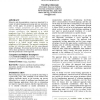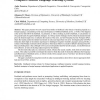3653 search results - page 31 / 731 » Learning of Partial Languages |
104
Voted
KCAP
2005
ACM
15 years 8 months ago
2005
ACM
Extensive and deep paraphrase corpora are important for a variety of natural language processing and user interaction tasks. In this paper, we present an approach which i) collect...
106
Voted
ICALT
2005
IEEE
15 years 8 months ago
2005
IEEE
Busy, active adults often do not have the time or ability to study in traditional, face-to-face classroom settings. In addition, adult learners may need access to content or exper...
110
Voted
WMTE
2008
IEEE
15 years 9 months ago
2008
IEEE
Mobile and ubiquitous learning facilitates language learners to continue their learning process outside the formal classroom, when and where they desire. While more and more learn...
126
click to vote
AIEDU
2007
15 years 2 months ago
2007
This paper presents two new corpus-based studies of feedback in the domain of teaching Spanish as a foreign language, concentrating on the type and frequency of different feedback ...
226
Voted
POPL
2006
ACM
16 years 2 months ago
2006
ACM
Functional programmers often reason about programs as if they were written in a total language, expecting the results to carry over to non-total (partial) languages. We justify su...


